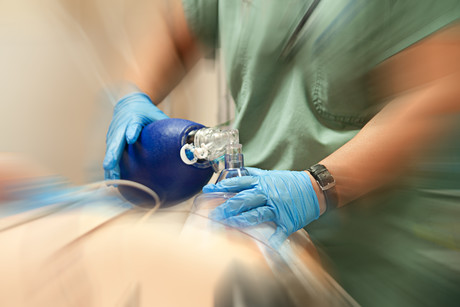Adrenaline risk for cardiac patients

Adrenaline use in cardiac arrest patients almost doubles the risk of severe brain damage in survivors.
A clinical trial has found that adrenaline use in cardiac arrest barely increases the number of people leaving hospital alive (<1% more) and almost doubles the risk of severe brain damage — raising important questions about the future use of adrenaline in such cases.
Each year 30,000 people sustain a cardiac arrest in the UK and less than one in 10 survive. The best chance of survival comes if the cardiac arrest is recognised quickly, someone starts cardiopulmonary resuscitation (CPR) and defibrillation (electric shock treatment) is applied without delay.
The application of adrenaline is one of the last things tried in attempts to treat cardiac arrest. It increases blood flow to the heart and increases the chance of restoring a heartbeat. However, it also reduces blood flow in very small blood vessels in the brain, which may worsen brain damage. Observational studies, involving over 500,000 patients, have reported worse long-term survival and more brain damage among survivors who were treated with adrenaline.
Despite these issues, until now there have been no definitive studies of the effectiveness of adrenaline as a treatment for cardiac arrest. This led the International Liaison Committee on Resuscitation to call for a placebo-controlled trial to establish if adrenaline was beneficial or harmful in the treatment of cardiac arrest. This ‘Pre-hospital Assessment of the Role of Adrenaline: Measuring the Effectiveness of Drug administration In Cardiac arrest (PARAMEDIC2)’ trial was undertaken to determine if adrenaline is beneficial or harmful as a treatment for out-of-hospital cardiac arrest.
The trial was funded by the National Institute for Health Research and undertaken by the University of Warwick — part of Warwick Medical School — in accordance with the EU Clinical Trials Directive, UK Clinical Trials Regulations and principles of Good Clinical Practice. The trial ran from December 2014 through October 2017. It was conducted in five National Health Service Ambulance Trusts in the United Kingdom and included 8000 patients who were in cardiac arrest. Patients were allocated randomly to be given either adrenaline or a saltwater placebo, and all those involved in the trial including the ambulance crews and paramedics were unaware which of these two treatments the patient received.
Of 4012 patients given adrenaline, 130 (3.2%) were alive at 30 days compared with 94 (2.4%) of the 3995 patients who were given placebo. However, of the 128 patients who had been given adrenaline and who survived to hospital discharge 39 (30.1%) had severe brain damage, compared with 16 (18.7%) among the 91 survivors who had been given a placebo. In this study a poor neurological outcome (severe brain damage) was defined as someone who was in a vegetative state requiring constant nursing care and attention, or unable to walk and look after their own bodily needs without assistance.
The reasons why more patients survived with adrenaline and yet had an increased chance of severe brain damage are not completely understood. One explanation is that although adrenaline increases blood flow in large blood vessels, it paradoxically impairs blood flow in very small blood vessels, and may worsen brain injury after the heart has been restarted. An alternative explanation is that the brain is more sensitive than the heart to periods without blood and oxygen, and although the heart can recover from such an insult, the brain is irreversibly damaged.
The results of the trial have now been published in the New England Journal of Medicine (NEJM) in an article entitled ‘A Randomised Trial of Epinephrine1 in Out-of-Hospital Cardiac Arrest’.
1. Epinephrine is the US drug name for adrenaline.
$1bn vaccine and antivenom manufacturing facility opens
A $1 billion cell-based influenza vaccine and antivenom manufacturing facility has opened in...
National concussion clinical guidelines now available
The first Australia- and New Zealand-specific guidelines for all forms of concussion — from...
Doctors criticise "risky prescribing agenda"
The AMA and RACGP have expressed disappointment in the Pharmacy Board of Australia's...

![[New Zealand] Transform from Security Awareness to a Security Culture: A Vital Shift for SMB Healthcare — Webinar](https://d1v1e13ebw3o15.cloudfront.net/data/89856/wfmedia_thumb/..jpg)
![[Australia] Transform from Security Awareness to a Security Culture: A Vital Shift for SMB Healthcare — Webinar](https://d1v1e13ebw3o15.cloudfront.net/data/89855/wfmedia_thumb/..jpg)




